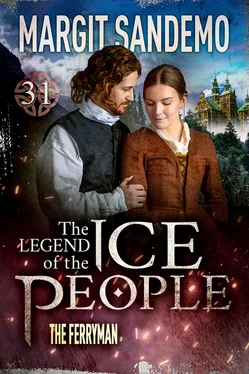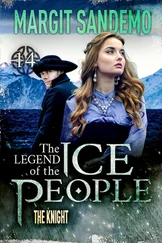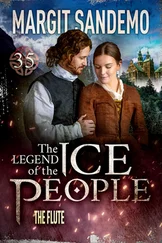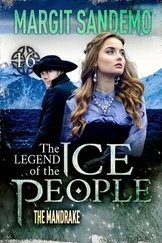But no, the sound she had heard hadn’t come from her room. It had come from upstairs. The sound of dragging footsteps on the floor above. Coming from the room that was empty.
There was someone up there walking – no, tiptoeing – very, very quietly. But the floorboards creaked, giving them away.
Still, Sidsel managed to calm down again. Whoever was tiptoeing around up there couldn’t reach her.
Then came a new sound. This time she recognized it: it was one she had heard many times before coming from her parents’ bedroom. The sound of the bedstead quietly creaking, rhythmically and subdued. She had never cared for the sound, even though she didn’t know what it was. It would usually get louder after a while, whereupon she always heard a thud against the wall followed by the sound of heavy breathing.
Those sounds usually awakened vague, unpleasant feelings within her.
The creaking sounds upstairs lasted for a long time and, just like at home, they grew louder and faster – and then fell completely silent. After a while she heard the dragging footsteps again.
The sound faded away and Sidsel crept back down under the covers.
The journey there had been hard on her. She finally fell into a deep sleep.
Her dreams were restless. There were rumbling, crashing and scratching sounds everywhere.
The last dream was unusually frightening, filled with ear-splitting noises.
She woke up so abruptly that her entire body jerked. She had heard a real sound, a loud bang and a thud.
And this time it was in her room, she was certain of it!
The moon was still just as bright. Sidsel stared into space, her heart galloping and her teeth chattering. She let out a small whimper.
Something had changed, but what?
Now she saw it! Someone must have been in there, because the two chairs next to the table in the middle of the room were now facing her, as though someone had nudged them or stumbled into them. And where was the little table by the wall?
Hadn’t there been a little table over there? And wasn’t there now a fallen statue lying there instead?
Perhaps her father had been to check up on her. And had accidentally walked into the chairs ...She wasn’t entirely convinced that there had actually been a table there; perhaps it hadn’t been there at all. And the sculpture could have been lying on the floor the whole time – the whole room was a jumble of objects.
Yes, most probably her father had been there.
She let out a sigh and a little moan as though she had been out running. She carefully said the word “Father” but got no response. Well, he must have gone back to his room. Sidsel put her head down on the pillow and closed her eyes.
But she opened them again immediately. There was a scratching, rustling sound coming from the floor. She stared and stared into space, but nothing was moving there.
But then ...
Sidsel’s heart nearly stopped beating.
Her gaze fell on a gigantic pier glass decorated with grotesque ornaments that didn’t seem to belong to any particular era at all. The reflection in the mirror allowed her to see parts of the room she otherwise wouldn’t have been able to.
And she saw a tall bookshelf, filled with ugly vases and conches and knick-knacks, slowly moving across the floor, gliding diagonally towards her end of the room.
Sidsel howled and jumped out of the bed, stumbled into a piece of furniture that hadn’t been standing there earlier in the evening, got up and ran through the rooms, screaming wildly, and waking the whole house.
“What on earth is it?” shouted her parents, drowsy and frightened.
Her tears came gushing forth and after they had received an almost incomprehensible explanation from the girl, they each lit a candle and entered the brown drawing room to see for themselves.
The chaos they found there was indescribable. The light of the flickering candles revealed furniture that had toppled over, ornaments that had landed on the other side of the room, broken porcelain and drawers that had been pulled out.
“Well, I never,” said Aunt Agnes, after having been rendered speechless for a while. “That’s quite impressive for an eight-year-old!”
“This isn’t Sidsel’s doing,” Ove objected. “She would never manage to move that cabinet!”
No, the aunts had to admit he was right about that.
“But who was it then?” asked Aunt Beate, looking as round as a marble in her scruffy robe. “Do you walk in your sleep, Ove?”
“No, I can assure you ...”
Sidsel sobbed. “No, it wasn’t Father. I saw the tall bookshelf with my own eyes: it moved on its own. No one was pushing it. “
“What rubbish!” said Aunt Gerd, her ample bosom trembling in indignation.
“Oh, my beautiful bookcase,” said Agnes, grieving over the abominable old monstrosity. “The glass is broken. Look! A vase has been hurled through it and destroyed the finest of the books inside! That’s going to cost you plenty, I can tell you!”
“But we ...” Guri began, but then she fell silent. It was going to be impossible for them to prove their innocence. The aunts would insist on having a scapegoat, or three. And preferably getting some money out of this as well.
As they stood there, unable to think clearly, an old mantel clock was hurled through the room and smashed into the wall with a loud bang.
“Say what you like,” said Ove, “but not even a grown man can throw that hard.”
They heard Aunt Gerd gasp. It sounded as though she was having a serious heart attack, but it must have been the shock, they assumed. With a trembling finger, her white, limp arm pointed towards the wall beside them.
Everyone stood petrified, staring at what she had just seen.
High up on the wall, perhaps half a meter from the ceiling, there was a deep imprint on the brown tapestry. The imprint was so deep that the wood panelling behind it had been dented.
It was clear for everyone to see what it was. The pawprint of a gigantic animal, with the marks of its claws and everything.
The puzzle was that no such animal existed.
Chapter 3
He was a tourist and didn’t know any better.
In a cheerful voice he asked the people at the first farm for directions to Fergeoset.
They demanded to know why he wanted to go there.
Uninhabited areas interested him, explained the young man, whose winning smile was not returned. “I’m very interested in folklore,” he continued, “And I’ve heard a few things about Fergeoset ...”
And he laughed again. But nothing but dead silence was the reaction from the three people on the farm. His laughter faded into a subdued, awkward sound.
“I don’t think you ought to go up there,” said the farmer finally. “There’s a good reason why it’s uninhabited.”
“Oh? I’m perfectly capable of determining that myself. If you would just be so kind as to tell me which road to take, then ...”
“There is no longer any road that goes there. But if you must get there at all costs, you will have to take the road that leads to the edge of the woods. There is a river there that you can follow, for it ends at Fergeoset.”
“Starts, you mean,” said the tourist teasingly, but when his cheerful smile wasn’t returned with any kind of sympathy he thanked them and trudged on.
The farm people watched him leave from behind their curtains.
He was well equipped for a hike in the fields and forest. He wore knickerbockers and sturdy lace-up boots, a windcheater, a cocked hat and a fully packed backpack from which various tools dangled. In terms of material equipment he had everything he needed.
But other than that ...?
The farmer’s wife shook her head and returned to her work.
Fergeoset had interested him ever since he had heard about it at Christmas. The name implied that it had once been quite a large settlement, since there had been a ferry there. “Oset”, meaning “mouth”, indicated that a river flowed out up there. In other words, there must also be a lake.
Читать дальше












